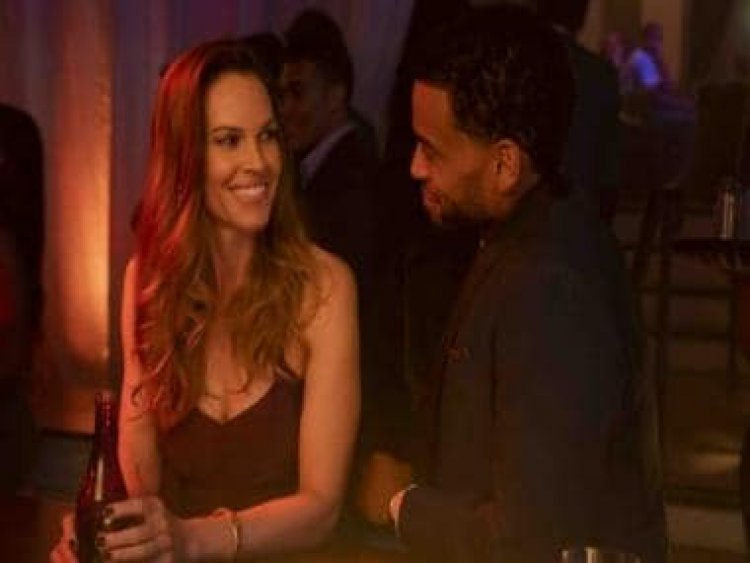Michael Ealy and Hilary Swank's Fatale is an erotic thriller low on both eroticism and thrills
Michael Ealy and Hilary Swank's Fatale is an erotic thriller low on both eroticism and thrills

Language: English
Fatale is based in upper-class Los Angeles. A rich man, who lives in one of those impossibly posh mansions in the hills that overlooks the neon-lit city, is in a failing marriage. So he slips off his wedding ring and engages in a one-night stand with a seductive stranger at a Las Vegas party. She’s a bit weird – the next morning, she coerces him into having sex again after locking away his phone. Once he’s back, he gives his marriage another shot. All is well, until a violent break-in almost kills him. The detective assigned to the case, of course, turns out to be the Vegas woman. And she isn’t pleased to know that he not only lied about his name earlier, he’s also married. Revenge – and a whole lot of stalking – is on her mind. So far, so lurid.
The setting of Fatale is anything but new. The premise is even older. But Deon Taylor’s film breaks new ground in terms of narrative identity. The cultural face of erotic noir has always been White. Even in its 1990s heyday, the only colour in these Hollywood films emerged from peripheral characters: mostly a Latin or African-American cop. Fatale subverts the template, while also speaking to America’s racism problem in a city notorious for police brutality. The rich man, Derrick (Michael Ealy), is Black; he co-owns a sports management company whose clients are primarily Black NBA players. The cop – who’s also the unhinged female stalker – is White. Detective Valerie Quinlan (Hilary Swank) gatecrashes the elite Black section of Los Angeles, and gleefully uses Derrick’s racial identity against him. More than once, she frames him and asks: Who will believe you? It’s a loaded question and one that hasn’t often been asked in tropey B-movie language. Actor Michael Ealy has light eyes, which further ties into the film’s historical reading of him as a White Black man, who is then reduced to his core ‘survival’ roots once the cop starts to manipulate his life.
But that’s where the novelty of Fatale ends. Its genre subversion isn’t as self-aware and smart as, say, a Get Out: The inherent seediness of an erotic thriller is often at odds with its real-world inferences. It doesn’t help that gimmicky odes to dated styles of storytelling end up looking just as dated these days. It isn’t clear if Fatale is unintentionally corny or just paying a cringe-tribute to the Disclosure, Fatal Attraction and Basic Instinct era. The writing is flimsy as ever. For instance, the way the one-night stand (and morning) plays out, there is no precedent for Valerie to feel as slighted as she does in Los Angeles. She keeps claiming that he “used” her and left. It never once looked that way. I can still get behind this primal motive of revenge – she simply wants to use him now, twisted as it may sound. She’s not racist; she’s just cuckoo.
But the film isn’t willing to trust in the woman simply being a woke psychopath. They decide to give her an actual motive: motherhood. Valerie is involved in a bitter custody battle with her slimy ex-husband and, at some point, the writing decides to link her desperation to get her daughter back with her crooked Derrick obsession. Valerie’s desire to use Derrick becomes rooted in her pursuit of single motherhood. The dimension of her personal life feels like a flimsy accessory in a film that was supposed to be a cautionary tale about lust, loneliness and cultural caricatures. Humanizing the antagonist dilutes the wicked irony of a rich Black man sleeping with – and evoking the carnal rage of – a broken White cop, of all the people. Valerie’s hipster-swanky studio apartment, too, is a tone-deaf appropriation of the Los Angeles it attempts to distort.
It’s tempting to look at two-time Oscar winner Hilary Swank’s performance – in a film she’s co-produced – as a playful stab at versatility. There’s not an actor in the world who doesn’t dream of playing a deranged killer. It’s almost amusing to see her mix it up (a bit too much) at this stage of her career. But I’d rather look at it as her phase of artful boredom. Most ‘serious’ performers tend to break out and experiment with midlife-crisis-level roles like these. That’s not to say Swank is terrible – she’s actually quite unconventional as the titular character, bringing her own brand of greyness to a person who seems to be both turned on and conflicted by her own sense of cultural power.
Michael Ealy is painfully wooden as Derrick, though. At points, his performance makes Fatale look like a tacky adult film that gets carried away with its weak plot. He’s so aware of his good looks that most early scenes (especially the Vegas flirting) look like parodies of infidelity dramas. It’s only fitting that the film opens with his poorly delivered voiceover: something about “not being ahead of the game anymore”. The film-making after that remains fatally behind the curve. After all, framing police brutality as a smutty genre construct is a radical idea – until it’s not.
Rating: 2/5
Fatale is streaming on Netflix
Rahul Desai is a film critic and programmer, who spends his spare time travelling to all the places from the movies he writes about.
Read all the Latest News, Trending News, Cricket News, Bollywood News, India News and Entertainment News here. Follow us on Facebook, Twitter and Instagram.
What's Your Reaction?

























































